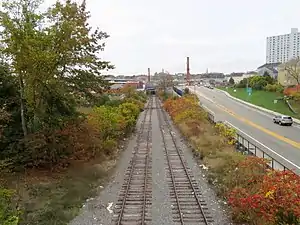Battleship Cove station
Battleship Cove is a proposed MBTA Commuter Rail station in Fall River, Massachusetts. It is planned to be the southern terminus of the Fall River branch of the South Coast Rail project, and will open in 2030 as part of the project's Phase II. The station will have no parking - it is intended for tourists visiting Battleship Cove and the Fall River waterfront, with Fall River station to the north serving commuters - and will be open seasonally. Previous passenger service to Fall River included stations at Fall River Wharf (1847-1937) and Ferry Street (1864-1958). The Wharf station was the terminus of the Fall River Line steamship service.
Battleship Cove | |||||||||||
|---|---|---|---|---|---|---|---|---|---|---|---|
 The planned station site, seen in October 2020 | |||||||||||
| Location | Ponta Delgada Boulevard Fall River, Massachusetts | ||||||||||
| Coordinates | 41°42′5.74″N 71°9′48.50″W | ||||||||||
| Line(s) | Fall River Subdivision | ||||||||||
| Platforms | 1 side platform (planned) | ||||||||||
| Tracks | 2 | ||||||||||
| Construction | |||||||||||
| Parking | None | ||||||||||
| Bicycle facilities | 10 spaces (planned) | ||||||||||
| Disabled access | Yes | ||||||||||
| History | |||||||||||
| Opening | 2030 (planned) | ||||||||||
| Closed | September 5, 1958 (previous station) | ||||||||||
| Services | |||||||||||
| |||||||||||
History
Previous stations

The Fall River Railroad opened from Myricks to Fall River in June 1845, and to the Old Colony Railroad at South Braintree in December 1846.[1]:403 In 1847, the Fall River and Old Colony began running the Boston–Fall River Boat Train, which met Fall River Line steamers from New York at the Fall River Wharf.[1]:403 Wharf station also served the surrounding industrial area.[2] The two railroads merged in 1854; after several name changes, it again became the Old Colony Railroad in 1872.[1]:376 The Old Colony subsidiary Old Colony and Newport Railroad opened between Fall River and Newport in 1864, with an additional station at Ferry Street in Fall River.[3][1]:416 Newport was the terminal of the steamers until 1869, when they returned to Fall River.[1]:416 In 1872, the Fall River Line became part of the Old Colony system; in 1893, the Old Colony in turn became part of the New Haven Railroad.[1]:401
Steamship service between Fall River and New York ended in 1937, and passenger service between Fall River and Newport ended the next year.[1]:416 Passenger service to Boston, with Ferry Street as the terminal, continued (except for 1949-1952) until September 5, 1958.[4][5] The line continued to be used for freight service by the New Haven and its successors Penn Central and Conrail, then finally as the CSX Fall River Subdivision. After the state purchased the line in 2010, freight service (which runs only as far south as Ferry Street) was transferred to the Massachusetts Coastal Railroad[1]:417
New station
In September 2008, MassDOT released 18 potential station sites for the South Coast Rail project, including two sites in Fall River. Fall River station would be a full-time station serving commuters, while Battleship Cove station would be a seasonal station for tourists visiting Battleship Cove and the Fall River waterfront.[6][7] A 2009 conceptual design called for a single side platform serving one track, with access at the center of the platform from City Gates Plaza.[8] Plans released as part of the Final Environmental Impact Report in 2013 moved the platform about 400 feet (120 m) to the south, and added a second track for freight trains to pass the station.[9]
In 2017, the project was re-evaluated due to cost issues. A new proposal released in March 2017 called for early service via Middleborough by 2024, followed by full service via Stoughton by 2029.[10] Battleship Cove would have only been built during the second phase.[11] By mid-2017, plans called for the first phase to be completed in 2022, and to include stations at Freetown and Battleship Cove in Phase 1 rather than Phase 2.[12] However, the Draft Supplemental Environmental Impact Report released in January 2018 pushed Battleship Cove back to Phase II.[13]
References
- Karr, Ronald Dale (2017). The Rail Lines of Southern New England (2 ed.). Branch Line Press. ISBN 9780942147124.
- "Plate 3". New Topographical Atlas of Surveys - Bristol County, Massachusetts. Everts & Richards. 1895. pp. 18–19 – via Ward Maps.
- "Plate 2". New Topographical Atlas of Surveys - Bristol County, Massachusetts. Everts & Richards. 1895. pp. 16–17 – via Ward Maps.
- Humphrey, Thomas J.; Clark, Norton D. (1985). Boston's Commuter Rail: The First 150 Years. Boston Street Railway Association. pp. 34–36. ISBN 9780685412947.
- "Table 19: Boston-New Bedford-Fall River". THE SCENIC SHORELINE ROUTE SERVING NEW YORK AND NEW ENGLAND. New York, New Haven and Hartford Railroad. April 24, 1955. p. 31 – via Wikimedia Commons.
- "South Coast Rail Fact Sheet: October 2008" (PDF). South Coast Rail. October 2008. Archived from the original (PDF) on August 12, 2017.
- "Rail sites picking up support". Herald News. December 12, 2008.
- "Fall River - Battleship Cove Rail Alternative" (PDF). Massachusetts Department of Transportation. June 30, 2009. Archived from the original (PDF) on January 4, 2014.
- "Figure 3.2-29 Battleship Cove Station Conceptual Station Design" (PDF). Volume II: FEIS/FEIR Figures Final Environmental Impact Statement/Final Environmental Impact Report on the South Coast Rail Project proposed by the Massachusetts Department of Transportation. U.S. Army Corps of Engineers New England District. August 2013.
- Dungca, Nicole (March 22, 2017). "State changes gears on Middleborough commuter rail plan". Boston Globe. Retrieved April 10, 2017.
- "Notice of Project Change". Massachusetts Department of Transportation. March 15, 2017.
- "South Coast Rail Corridor Map" (PDF). South Coast Rail - Summer 2017 Fact Sheet. Massachusetts Department of Transportation. Summer 2017. p. 3. Archived from the original (PDF) on September 5, 2017.
- VHB/HNTB (January 31, 2018). "Executive Summary". South Coast Rail Draft Supplemental Environmental Impact Report. Massachusetts Department of Transportation. p. 7.